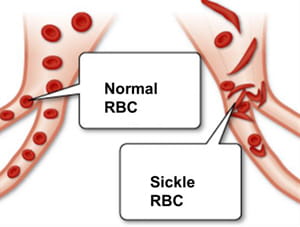Projects
The “Engaging Parents of Children with Sickle Cell Anemia and their Clinicians in Shared Decision-Making for Hydroxyurea” study examines two ways to promote shared decision-making about hydroxyurea between clinicians and parents of young children with sickle cell disease. A shared decision-making process or one that includes both medical evidence and parent/family values can lead to parents feeling less uncertain about a treatment decision. Both ways (pocket guide and toolkit) were tested at clinics across the United States.
Sickle cell disease is an inherited blood disorder that affects red blood cells and turns them into a “sickle” (half-moon) shape. These cells can block blood flow and oxygen and cause health problems such as lung tissue damage (acute chest syndrome), pain episodes (arms, legs, chest and abdomen), and stroke).
Project Details:
- More Information: Learn more about our ENGAGE HU study.
- Collaborators: Twelve Children’s Hospitals across the United States, Sickle Cell Disease Association of America
- Funding: Patient-Centered Outcomes Research Institute (PCORI)
The ATTACH study examines changes in attitudes and beliefs about COVID-19, adherence to behavioral strategies (e.g., physical distancing, handwashing) and the impact on mental and physical health for adults and populations most affected by COVID-19 such as people with chronic medical conditions, Black, African-American, African, LatinX, and People of Color.
Project Details:
- More Information: Learn more about our ATTACH study.
- Related News: Updates from the project were shared during a CCTST Grand Rounds presentation
- Collaborators: Local community partners served on an Advisory Board for the project and helped design polls and which poll data to display on the study website
- Funding: Cincinnati Center for Translational Science and Training (CCTST)
This study examines factors associated with the intention to receive a COVID-19 vaccine among adolescents, young adults, and parents of children living with sickle cell disease.
Project Details:
- Collaborators: Four Children’s Hospitals across the United States
- Funding: American Society of Hematology Research Collaborative
This study examines the experiences of youth and teens receiving medical care for sickle cell disease may experience stigma and racism. We will also examine their experiences with pain, adverse life experiences and COVID-19. Study results will help us better understand barriers youth and teens may be facing that can be addressed to improve care.
Project Details:
- Collaborators: Multidisciplinary team with psychologists, hematologists, primary care physicians and staff
- Funding: University of Cincinnati and Children’s Hospital Medical Center
The objective of the project is to determine the feasibility and acceptability of SCThrive, a self-management intervention, and to evaluate its initial efficacy for increasing behavioral activation in adolescents with sickle cell disease.
Project Details:
- More Information: Learn more about the SCThrive study.
- Collaborators: Individuals living with sickle cell disease and their clinicians worked together on this study.
- Funding: National Institutes of Health
The goal of this study is to describe the current primary care usage of children with sickle cell disease and understand their parents’ perspectives on accessing primary care and co-management of sickle cell disease by primary care physicians and hematology specialists.
Project Details:
- More information: Learn more about Dr. Alexandra Corely who is leading this study.
- Collaborators: Multidisciplinary team of primary care physicians, hematologists, psychologists, and staff
- Funding: Cincinnati Children’s Hospital Medical Center




